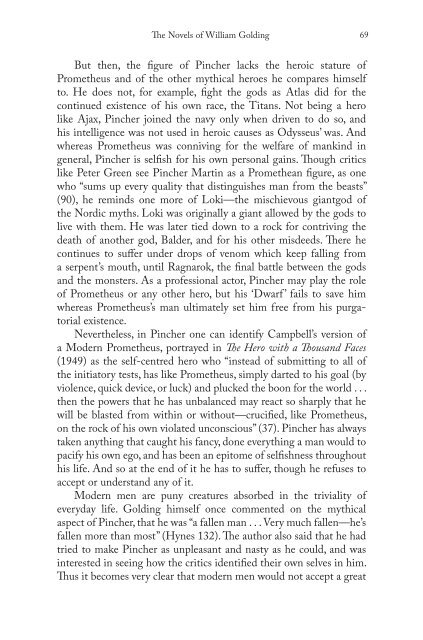Blooms Literary Themes - THE TRICKSTER.pdf - ymerleksi - home
Blooms Literary Themes - THE TRICKSTER.pdf - ymerleksi - home
Blooms Literary Themes - THE TRICKSTER.pdf - ymerleksi - home
Create successful ePaper yourself
Turn your PDF publications into a flip-book with our unique Google optimized e-Paper software.
Th e Novels of William Golding 69<br />
But then, the fi gure of Pincher lacks the heroic stature of<br />
Prometheus and of the other mythical heroes he compares himself<br />
to. He does not, for example, fi ght the gods as Atlas did for the<br />
continued existence of his own race, the Titans. Not being a hero<br />
like Ajax, Pincher joined the navy only when driven to do so, and<br />
his intelligence was not used in heroic causes as Odysseus’ was. And<br />
whereas Prometheus was conniving for the welfare of mankind in<br />
general, Pincher is selfi sh for his own personal gains. Th ough critics<br />
like Peter Green see Pincher Martin as a Promethean fi gure, as one<br />
who “sums up every quality that distinguishes man from the beasts”<br />
(90), he reminds one more of Loki—the mischievous giantgod of<br />
the Nordic myths. Loki was originally a giant allowed by the gods to<br />
live with them. He was later tied down to a rock for contriving the<br />
death of another god, Balder, and for his other misdeeds. Th ere he<br />
continues to suff er under drops of venom which keep falling from<br />
a serpent’s mouth, until Ragnarok, the fi nal battle between the gods<br />
and the monsters. As a professional actor, Pincher may play the role<br />
of Prometheus or any other hero, but his ‘Dwarf ’ fails to save him<br />
whereas Prometheus’s man ultimately set him free from his purgatorial<br />
existence.<br />
Nevertheless, in Pincher one can identify Campbell’s version of<br />
a Modern Prometheus, portrayed in Th e Hero with a Th ousand Faces<br />
(1949) as the self-centred hero who “instead of submitting to all of<br />
the initiatory tests, has like Prometheus, simply darted to his goal (by<br />
violence, quick device, or luck) and plucked the boon for the world . . .<br />
then the powers that he has unbalanced may react so sharply that he<br />
will be blasted from within or without—crucifi ed, like Prometheus,<br />
on the rock of his own violated unconscious” (37). Pincher has always<br />
taken anything that caught his fancy, done everything a man would to<br />
pacify his own ego, and has been an epitome of selfi shness throughout<br />
his life. And so at the end of it he has to suff er, though he refuses to<br />
accept or understand any of it.<br />
Modern men are puny creatures absorbed in the triviality of<br />
everyday life. Golding himself once commented on the mythical<br />
aspect of Pincher, that he was “a fallen man . . . Very much fallen—he’s<br />
fallen more than most” (Hynes 132). Th e author also said that he had<br />
tried to make Pincher as unpleasant and nasty as he could, and was<br />
interested in seeing how the critics identifi ed their own selves in him.<br />
Th us it becomes very clear that modern men would not accept a great

















